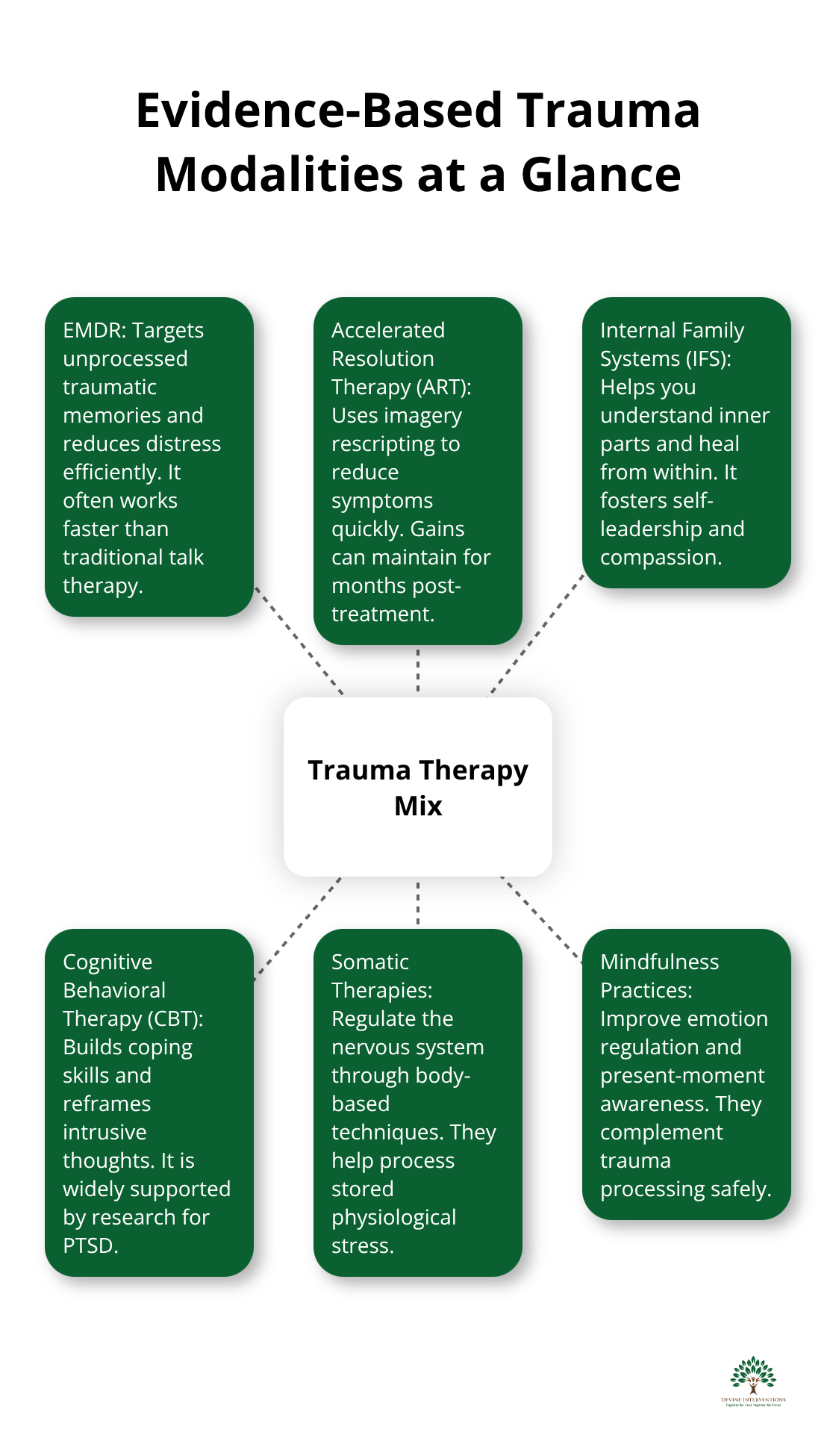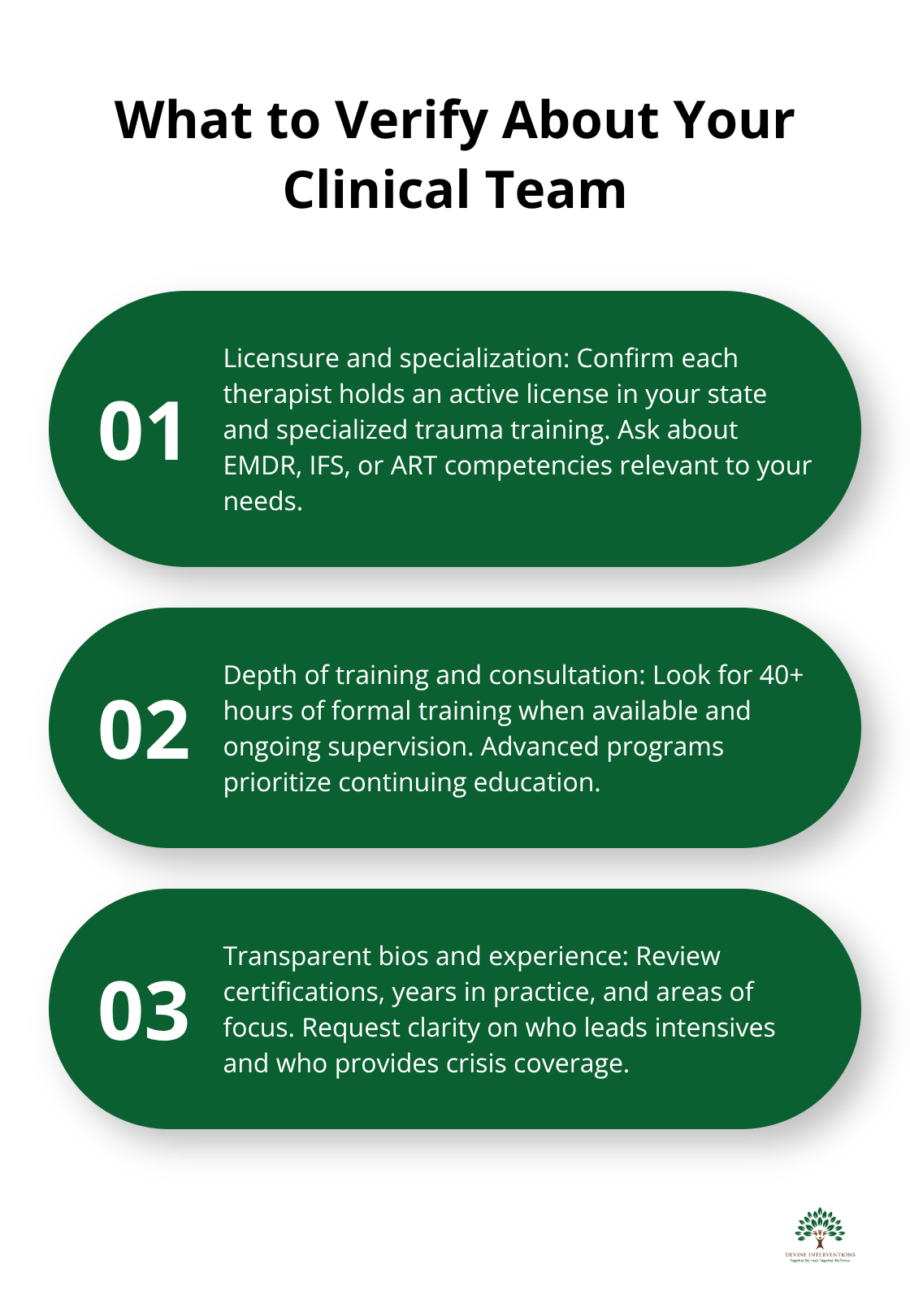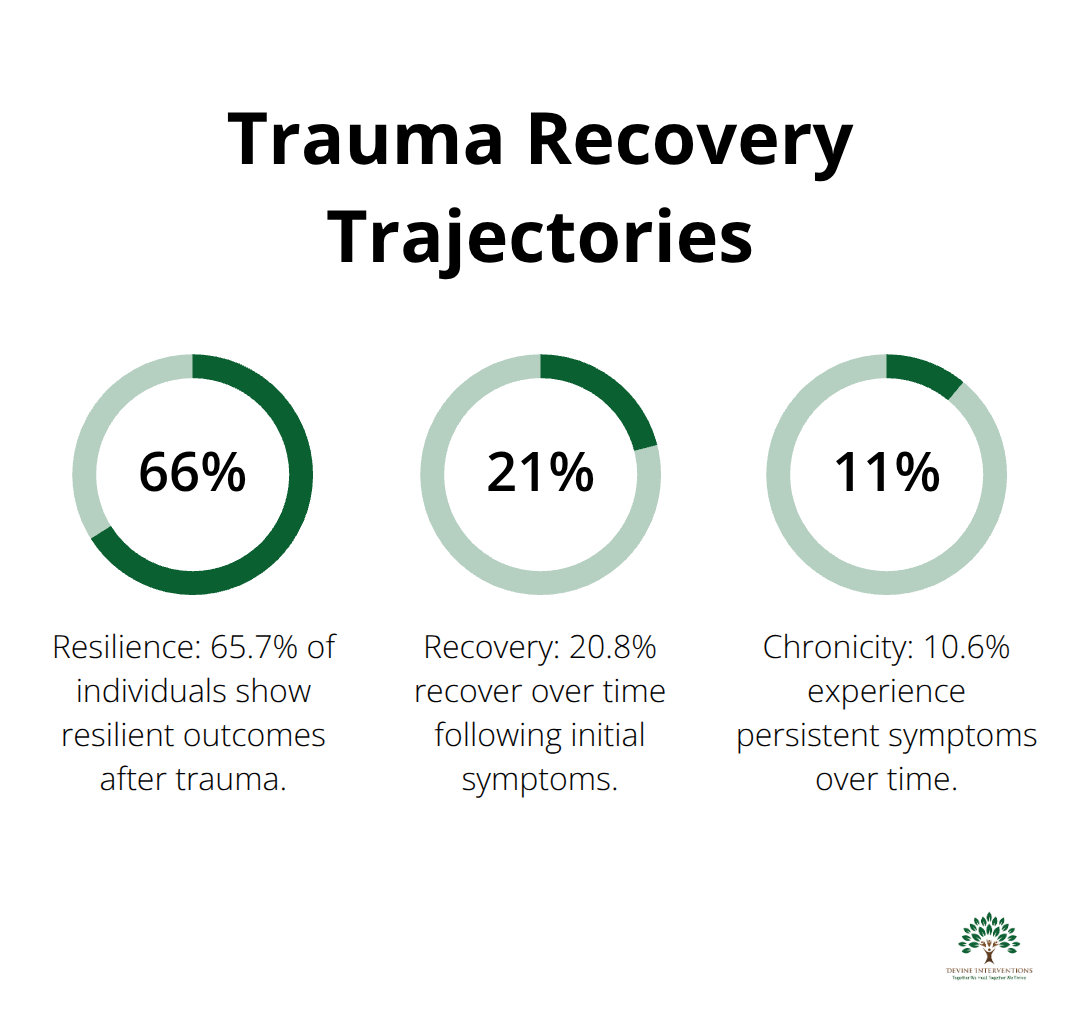Finding the right trauma therapy retreat can feel overwhelming when you’re already struggling with difficult experiences. The healing process requires a safe, supportive environment with qualified professionals who understand your unique needs.
We at Devine Interventions know that choosing the wrong program can set back your recovery journey. This guide will help you identify quality retreats and avoid costly mistakes that could impact your healing.
What Types of Trauma Therapy Retreats Exist
Residential vs Day Programs
Residential trauma retreats provide 24/7 therapeutic support with participants who stay on-site for 3-7 days. These intensive programs deliver 3-7 hours of daily therapy without the distractions of everyday life. Research shows that participants in residential intensive trauma retreats report improvements in life satisfaction that last. Day programs allow you to return home each evening while you attend structured therapy sessions during the day.
Residential programs work better for complex trauma or when you need complete separation from environments that trigger you. Day programs suit those with work or family obligations who cannot commit to overnight stays. The choice depends on your specific trauma history and current life circumstances.
Treatment Approaches and Modalities
EMDR therapy resolves unprocessed traumatic events in fewer sessions compared to traditional talk therapy (American Psychological Association confirms this effectiveness). Accelerated Resolution Therapy shows gains that maintain for at least 4 months post-treatment based on clinical studies. Internal Family Systems therapy helps you understand different parts of yourself and heal from within.

Ketamine-assisted retreats create optimal conditions for neuroplasticity, which makes traumatic memory processing easier. Some retreats combine multiple modalities like CBT with somatic practices that heal. Single-incident PTSD responds particularly well to intensive therapy approaches, with clients who often experience rapid recovery within days.
Duration and Intensity Considerations
Weekend micro intensive retreats offer powerful transformation in just three days and work well as standalone treatments or booster sessions. Week-long programs typically cost $4,000 to $9,000 (this includes accommodations and meals). Shorter intensives work best for specific incidents or recent trauma that needs attention.
Longer programs benefit those with childhood trauma or complex PTSD that requires deeper processing. The immersive environment allows your brain to rewire itself through neuroplasticity during intensive therapy sessions. Most quality programs include follow-up telehealth sessions to maintain therapeutic progress after you return home.
Evidence-Based vs Alternative Approaches
Quality retreats use therapies that research validates rather than unproven methods that promise quick fixes. Look for programs that offer CBT, EMDR, or ART as their primary treatment modalities. Some retreats incorporate complementary approaches like yoga or meditation alongside evidence-based therapies.
Avoid programs that rely solely on alternative methods without scientific backing. The most effective retreats combine traditional therapeutic approaches with holistic wellness practices that support your overall recovery process.
When you evaluate these different retreat types, consider how each approach aligns with your specific trauma history and recovery goals.
What Should You Look for in Quality Staff and Programs
Therapist credentials matter more than fancy facilities when you select a trauma retreat. All therapists must hold active licenses with specialized training in trauma-specific modalities like EMDR, Internal Family Systems, or Accelerated Resolution Therapy. Ask directly about each therapist’s years of experience treating your specific type of trauma. Programs with therapists who have insufficient trauma-specific training often lack the expertise to handle complex cases safely.
Clinical Team Qualifications That Matter
Quality retreats employ licensed clinical social workers, licensed professional counselors, or psychologists who specialize in trauma treatment. The American Psychological Association recommends therapists complete at least 20 hours of EMDR training before they treat clients, but excellent programs require 40+ hours plus ongoing consultation. Programs should provide detailed therapist bios that list specific certifications, years of experience, and areas of specialization.

Safety screenings conducted by qualified clinicians determine your readiness for intensive trauma processing before you arrive. Retreats that skip these assessments put participants at risk for retraumatization. Licensed professionals must conduct these evaluations to identify any contraindications for intensive work.
Evidence-Based Treatment Philosophy
Programs that combine multiple evidence-based approaches show better outcomes than single-modality retreats. The most effective programs integrate EMDR with somatic therapies or CBT with mindfulness practices based on your individual needs. Standardized assessments track your progress objectively by measuring trauma symptoms, anxiety levels, and quality of life before and after treatment.
Retreats should explain their treatment philosophy clearly and provide research citations that support their methods. Programs that promise healing without addressing the hard work of processing trauma lack credibility and scientific backing. Look for retreats that acknowledge the complexity of trauma recovery rather than offering oversimplified solutions.
Therapeutic Environment and Setting
The physical environment directly impacts your healing process during intensive trauma work. Retreats located in natural settings like forests or near water bodies reduce cortisol levels and promote relaxation better than urban locations. Private therapy rooms allow safe processing of sensitive material without distractions or privacy concerns.
Common areas should feel welcoming but not overstimulating for people who deal with hypervigilance or anxiety. Programs that house more than 12 participants simultaneously often cannot provide the individualized attention that trauma recovery requires. The facility should maintain quiet spaces where you can decompress between sessions.
Staff-to-Participant Ratios and Support Structure
Quality programs maintain low staff-to-participant ratios (typically 1:4 or better) to provide adequate supervision and support. Night staff should include licensed mental health professionals who can handle crisis situations that may arise during intensive processing. Programs should clearly outline their crisis intervention protocols and emergency procedures.
Look for retreats that provide 24/7 clinical support rather than just administrative staff overnight. The support structure should include both individual and group processing opportunities with qualified facilitators who understand trauma responses. Consider exploring play therapy activities for trauma recovery as part of comprehensive treatment approaches.
While these staff and program factors form the foundation of quality care, you also need to examine the specific warning signs that indicate programs to avoid completely.
What Warning Signs Should You Avoid
Unrealistic Promises and Healing Guarantees
Retreats that guarantee complete healing within specific timeframes reveal fundamental misunderstandings about trauma recovery. Research shows that resilience occurs in 65.7% of cases following trauma, with recovery in 20.8% and chronicity in 10.6%, which makes promises like “100% PTSD elimination in 5 days” both dishonest and potentially harmful. Quality programs acknowledge that intensive therapy produces remarkable results, but individual timelines differ based on trauma complexity, personal history, and readiness for change.

Programs that promise to cure you completely or claim universal success rates manipulate vulnerable people who seek hope. Legitimate retreats discuss realistic expectations and acknowledge that healing requires ongoing commitment beyond the retreat experience.
Programs Without Proper Licenses Create Serious Risks
Licensed therapists must meet specific educational and supervised clinical practice requirements, pass licensing exams, and commit to continuing education that unlicensed practitioners skip entirely. Check state boards directly to verify each therapist’s credentials rather than trust program websites that may contain outdated information. Facilities that operate without proper accreditation from organizations like The Joint Commission or CARF lack oversight and quality standards that protect participants.
Programs that cannot provide current license numbers, malpractice insurance details, or accreditation documentation operate outside regulatory frameworks designed for your safety. Never attend retreats where unlicensed staff conduct therapy sessions or where facilities lack proper mental health treatment permits.
Poor Reviews and Limited Transparency Signal Problems
Programs that refuse to provide detailed treatment schedules, therapist qualifications, or clear pricing structures hide information that quality retreats share openly. Legitimate retreats provide references from past participants, detailed daily schedules, and transparent policies about refunds or early departure procedures (these details protect both you and the program).
Check multiple review platforms beyond their website testimonials, including Google Reviews, Better Business Bureau ratings, and mental health forums where people discuss experiences honestly. Programs with consistently negative reviews about inadequate crisis support, unqualified staff, or unsafe environments demonstrate patterns you should avoid completely. Quality retreats address negative feedback professionally and implement changes based on participant concerns.
Final Thoughts
Quality trauma therapy retreats combine evidence-based treatments with qualified staff who understand your specific trauma history. The investment in intensive therapy can transform your life when you choose programs that prioritize safety and clinical excellence. Your decision to attend a trauma therapy retreat represents a significant step toward recovery from trauma’s impact.
We at Devine Interventions understand that trauma affects every aspect of your life. Our approach includes individual therapy, group sessions, and specialized treatment options that address both immediate symptoms and long-term recovery goals. Take time to verify credentials, ask detailed questions about treatment approaches, and trust your instincts about program quality.
The right retreat will provide the intensive support you need to process difficult experiences safely. Professional guidance helps you evaluate options and prepare for treatment that fits your specific circumstances (this preparation often determines treatment success). Professional mental health support can help you take this important step toward healing and reclaim your life from trauma.







